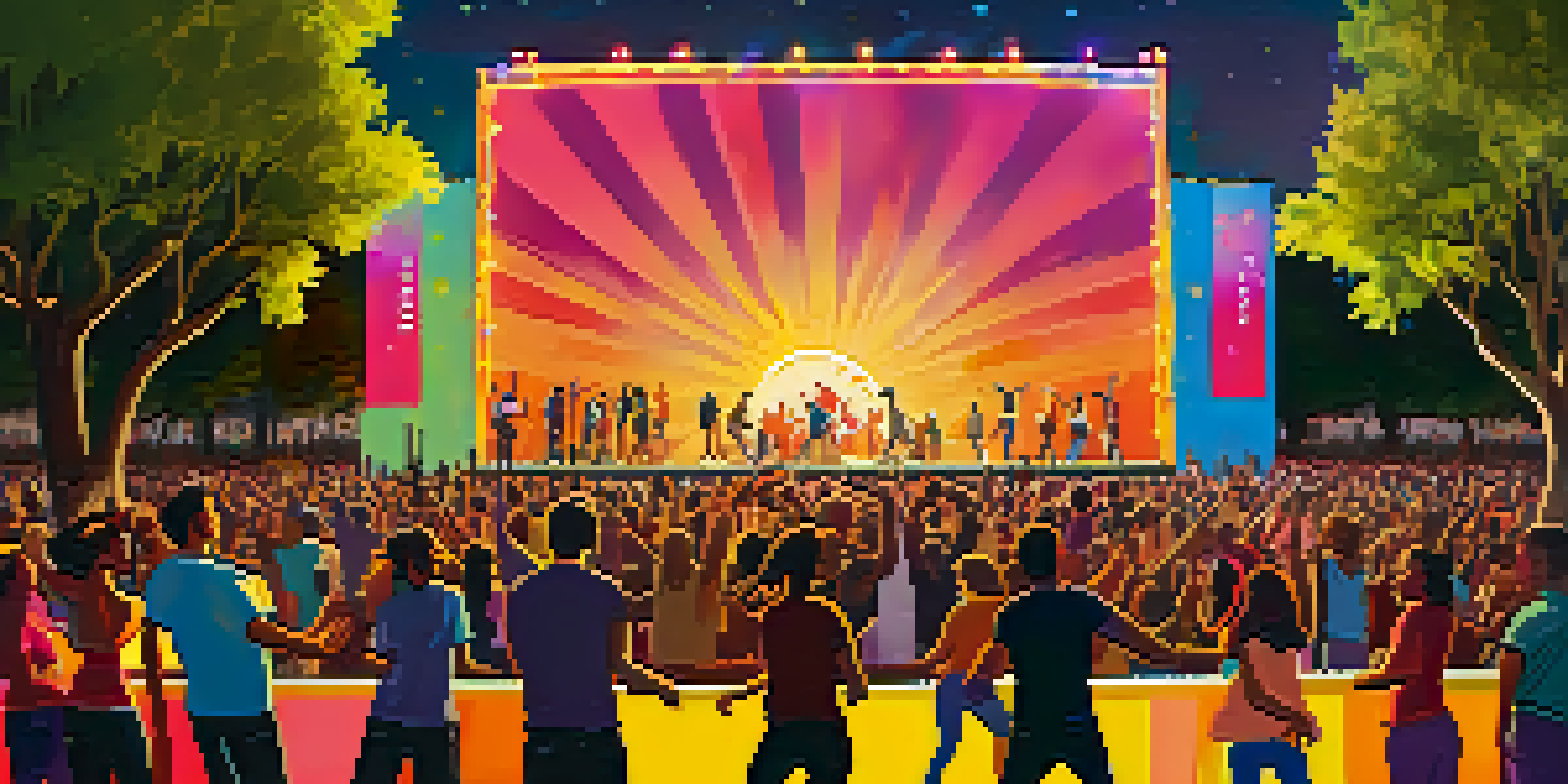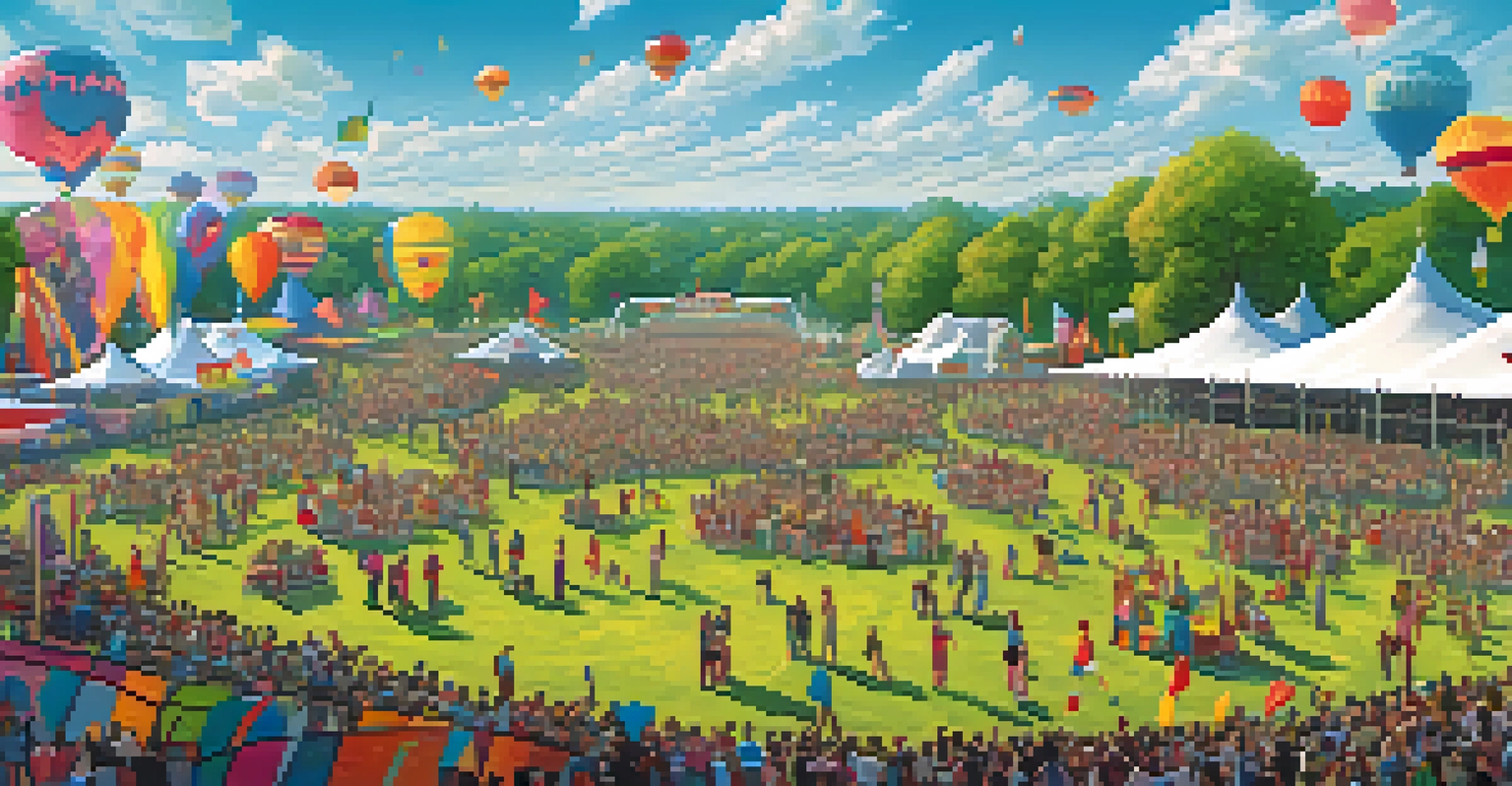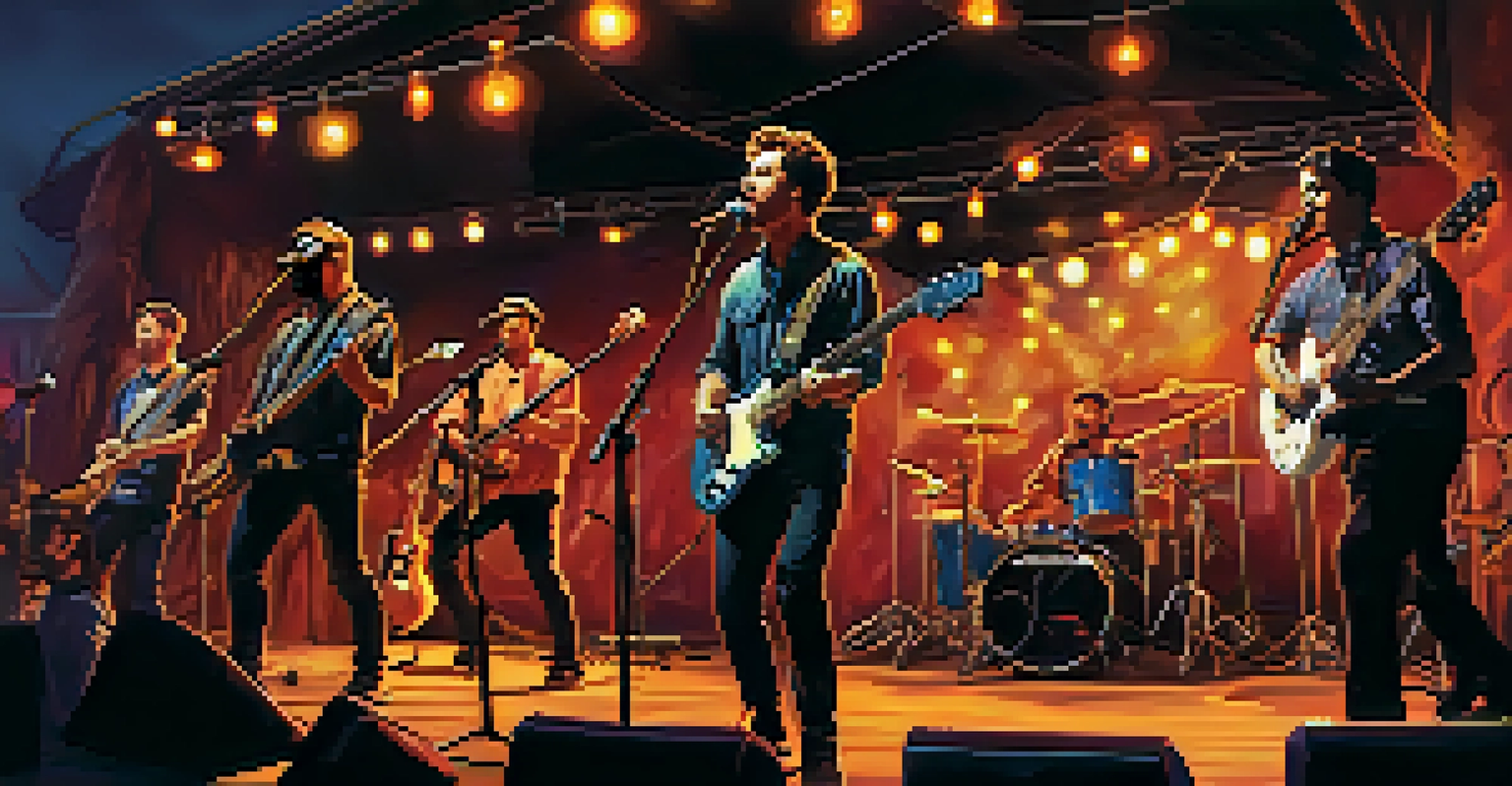Music Festivals: Celebrating Sounds of the City Each Year

The Heartbeat of Urban Culture: Music Festivals
Music festivals serve as a vibrant reflection of a city's culture, bringing together diverse communities through the universal language of music. Each year, they create a unique space where people can share experiences, discover new sounds, and embrace the spirit of togetherness. Whether it’s a massive event in a city park or a more intimate gathering in a local venue, these festivals breathe life into urban landscapes.
Music can change the world because it can change people.
Take, for instance, the famous South by Southwest (SXSW) in Austin, Texas. This festival not only showcases emerging artists but also celebrates the city's rich musical heritage. It’s a melting pot of genres, where everything from indie rock to hip-hop can be found, illustrating how music evolves and intertwines with local culture.
In essence, music festivals are the heartbeat of urban life, pulsating with energy, creativity, and community. They offer a platform for artists to shine, while allowing attendees to connect with one another in a shared love for music.
A Melodic Journey: The Evolution of Music Festivals
The concept of music festivals has evolved dramatically over the years. What began as small gatherings of musicians and fans has transformed into large-scale events that attract thousands, if not millions, of attendees. The original festivals, like Woodstock in 1969, set the stage for communal musical experiences and cultural movements.

Today, festivals such as Coachella and Glastonbury have taken this idea to new heights, blending music with art, food, and fashion. They are not just about the performances; they encapsulate a lifestyle and a culture that resonates with people from all walks of life. This evolution highlights how music festivals have become a focal point for cultural expression and communal celebration.
Music Festivals Unite Communities
Music festivals bring together diverse communities, showcasing local talent and promoting shared experiences through the universal language of music.
As we look to the future, one can only imagine how these festivals will continue to change. The integration of technology, for example, is paving the way for virtual festivals that reach global audiences, proving that the joy of music knows no boundaries.
Local Talent Takes Center Stage at Festivals
One of the most rewarding aspects of music festivals is their ability to shine a spotlight on local talent. Cities often use these events as a way to promote homegrown artists, giving them a platform to reach wider audiences. This not only supports local musicians but also enriches the festival experience for attendees who get a taste of their city's sound.
The power of music makes all the difference. It can create a sense of community and belonging.
For example, in New Orleans, the Jazz & Heritage Festival showcases local musicians alongside big-name acts, ensuring that the rich musical heritage of the city is celebrated. Attendees can discover new favorites while enjoying the familiar sounds of their local scene, creating a sense of pride and connection.
In this way, music festivals not only entertain but also foster a sense of community. They remind us that while we may revel in global hits, there’s something special about supporting local artists and celebrating the sounds that define our cities.
The Impact of Music Festivals on Local Economies
Music festivals do more than just entertain; they have a significant impact on local economies. By attracting thousands of visitors, they generate revenue for hotels, restaurants, and local businesses, fostering economic growth in the area. This influx of tourism often leads to job creation and boosts the visibility of the host city.
For instance, the annual Lollapalooza in Chicago brings in millions of dollars, benefiting local vendors and service providers. Many cities actively promote festivals as a means to enhance their economic profile, recognizing the potential for increased tourism and investment.
Economic Boost from Festivals
These events significantly impact local economies by attracting visitors, generating revenue, and creating jobs for the host city.
However, it’s crucial for cities to balance the economic benefits with the needs of local residents. Sustainable practices and community involvement are essential to ensure that festivals positively contribute to the urban landscape without overwhelming it.
Sustainability: A Growing Focus for Music Festivals
In recent years, sustainability has become a hot topic among music festivals. With increasing awareness of environmental issues, many festivals are taking steps to reduce their carbon footprint and promote eco-friendly practices. This shift is crucial, as events with large crowds can generate significant waste and energy consumption.
Festivals like Glastonbury have implemented initiatives such as recycling programs, composting, and renewable energy sources to minimize their environmental impact. By setting an example, these festivals inspire attendees to adopt more sustainable practices in their daily lives.
As the conversation around climate change continues to grow, it’s encouraging to see the music industry leading the way in promoting sustainability. This commitment not only enhances the festival experience but also ensures that future generations can enjoy the magic of live music.
Creating Lasting Memories: The Festival Experience
What truly makes music festivals special is the unforgettable experiences they create. From the thrill of discovering new artists to the joy of dancing with friends under the stars, these events forge lasting memories that attendees cherish for years to come. Each festival is a unique blend of sights, sounds, and emotions that stay with us long after the final performance ends.
Think of the iconic moments – the surprise collaborations, the crowd singing along to a favorite anthem, or the euphoric energy of a live performance. These are the experiences that bind us together as music lovers and create a sense of community around shared passions.
Sustainability in Festival Culture
Many festivals are adopting eco-friendly practices to reduce their environmental impact, inspiring attendees to embrace sustainability in their own lives.
Ultimately, music festivals are about more than just the music; they encapsulate the essence of joy, freedom, and connection. They remind us of the power of music to unite people from different backgrounds and create shared experiences that we will carry with us throughout our lives.
Looking Ahead: The Future of Music Festivals
As we look to the future, the landscape of music festivals continues to evolve. With advancements in technology, we’re seeing innovations such as virtual reality experiences and live streaming events that allow fans from all over the world to join in the fun. This opens up new avenues for engagement and accessibility, ensuring that the magic of festivals can reach even wider audiences.
Additionally, the emphasis on diversity and inclusion is becoming increasingly important in festival lineups. Many organizers are now prioritizing representation, showcasing artists from various backgrounds and genres, creating a richer and more inclusive musical tapestry.

While the core essence of music festivals will always remain – the celebration of sound and community – the future holds exciting possibilities. As we embrace these changes, we can look forward to more innovative, inclusive, and memorable festival experiences that resonate with everyone.